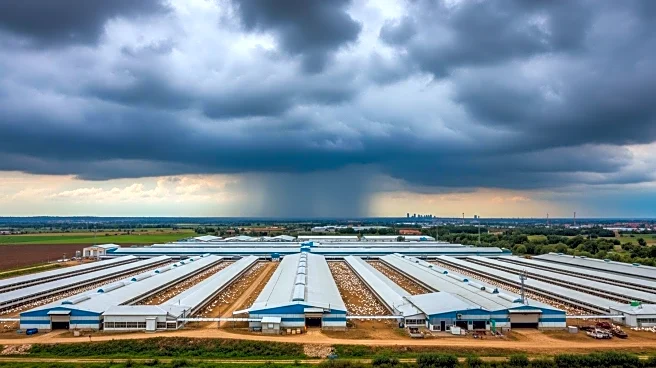What's Happening?
A proposed chicken farm in Toynton St Peter has sparked significant concern among local residents due to a report suggesting that air pollution from the farm could be comparable to that found on a busy stretch of the M25 motorway. Dr. Michael Bull, commissioned by animal rights activists, claims that fine particles known as PM2.5 emitted from the farm would be similar in concentration to those from a section of the M25 carrying 160,000 vehicles daily. The farm, which could house 180,000 birds, has faced opposition from villagers worried about health implications. The Toynton Action Group has formally opposed the planning application, citing the potential health risks associated with increased PM2.5 levels, which are linked to various respiratory and cardiovascular diseases. Despite assurances from planning agents about significant separation distances between the farm and homes, villagers remain concerned about the potential impact on air quality.
Why It's Important?
The controversy surrounding the proposed chicken farm highlights broader environmental and public health concerns associated with intensive farming practices. PM2.5 particles, which can penetrate deep into the lungs and enter the bloodstream, pose significant health risks, including strokes, heart diseases, and lung cancer. The situation underscores the need for careful consideration of air quality impacts in rural areas, where residents may expect cleaner air compared to urban environments. The debate also reflects ongoing tensions between agricultural development and community health, with potential implications for local policy decisions and environmental regulations. If approved, the farm would add to the already substantial number of poultry units in Lincolnshire, raising questions about cumulative environmental impacts.
What's Next?
The planning application for the Toynton chicken farm is currently under review by the East Lindsey District Council, which will consider all submitted information before making a decision. Should the application be approved, it would become the 857th poultry farm in Lincolnshire. The Environment Agency has stated its commitment to reducing pollution from agriculture and regulating intensive farms, suggesting potential future regulatory actions. Local residents and environmental groups are likely to continue their advocacy against the farm, potentially influencing public opinion and policy. The outcome of this case could set a precedent for how similar agricultural developments are assessed and managed in terms of environmental impact.
Beyond the Headlines
The proposed chicken farm in Toynton St Peter raises ethical questions about the balance between agricultural productivity and environmental stewardship. The reliance on intensive farming practices to meet consumer demand for affordable meat must be weighed against the potential health and environmental costs. This situation also highlights the role of scientific assessments in shaping public policy and community responses, as well as the influence of advocacy groups in environmental decision-making. Long-term, the case may contribute to broader discussions on sustainable farming practices and the need for innovative solutions to mitigate pollution while supporting agricultural economies.









